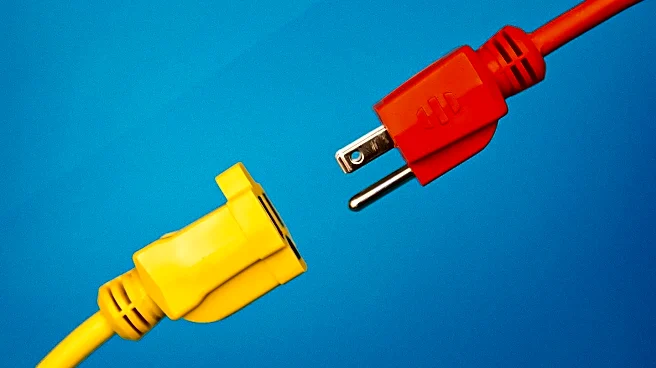What's Happening?
An electrical safety expert, Paul Martinez, has issued a warning about the dangers of using extension cords for high-power appliances. Martinez, owner of Electrified NYC, emphasizes that devices with heating
elements, such as space heaters, air fryers, and coffee makers, should not be connected to extension cords or power strips due to the risk of fire hazards. He highlights that appliances like air fryers can draw up to 2,000 watts, making them a significant fire risk if not plugged into a dedicated wall outlet. Other appliances, including microwaves, toasters, and refrigerators, also pose risks when connected to extension cords, as they can lead to overheating and potential fires. Martinez advises that extension cords should never be daisy-chained, a practice that can cause circuits to overheat. He stresses that extension cords should only be used for electronics and not for appliances, which should be on dedicated circuits.
Why It's Important?
The warning from Martinez is crucial for preventing household fires and ensuring electrical safety. High-power appliances require stable and sufficient power supply, which extension cords may not provide, leading to overheating and fire risks. This advice is particularly relevant for older homes and small apartments where outlet availability is limited. By following these guidelines, homeowners can reduce the risk of electrical fires, which are a common cause of property damage and personal injury. The Consumer Product Safety Commission has reported that portable space heaters alone are involved in approximately 1,700 fires annually, underscoring the importance of proper appliance connection. This information is vital for public safety and can help consumers make informed decisions about appliance usage and electrical safety in their homes.
What's Next?
Homeowners and renters are encouraged to assess their current appliance setups and ensure that high-power devices are connected directly to wall outlets. Martinez suggests using online BTU calculators to determine the appropriate air conditioning unit size for effective cooling without overworking the compressor. This proactive approach can prevent increased electricity bills and potential fire hazards. Additionally, consumers should be educated on the limitations of extension cords and the importance of using dedicated circuits for appliances. Electrical safety campaigns and public service announcements could further raise awareness and promote safer practices in homes across the U.S.
Beyond the Headlines
The broader implications of this warning touch on the need for improved electrical infrastructure in older buildings and apartments. As modern appliances become more energy-intensive, the demand for adequate electrical systems grows. This situation highlights the importance of updating electrical codes and standards to accommodate contemporary appliance usage. Furthermore, the advice underscores the cultural shift towards energy efficiency and safety, encouraging consumers to prioritize these aspects in their daily lives. Long-term, this could lead to increased demand for electrical upgrades and renovations, impacting the construction and home improvement industries.









